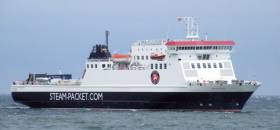Displaying items by tag: Manx Parliament: Tynwald
Manx Parliament To Mull Future of Isle of Man’s Sea Services
#FerryFuture - Nationalisation or acquisition of the Isle of Man Steam Packet, franchising of ferry services to a private operator and keeping or extending the user agreement are among options being reviewed as part of a proposed new sea services policy.
But no decision writes IOM Today will be made on whether or not to accept the Steam Packet’s £170m offer [including a pair of newbuilds] to government until the April Tynwald.
Infrastructure Minister Ray Harmer MHK will seek Tynwald support this month for the next step in his department’s bid to secure reliable and affordable lifeline ferry services into the future.
Members will be called on to endorse the Strategic Sea Services Policy which suggests that a level of state intervention is needed in ferry services. For more click here.
Afloat adds that the historic company dating to 1830 operates a network of routes including summer services among them Douglas-Belfast and Douglas-Dublin. In addition sailings between the Manx and Irish capitals during the festive season operating on selected dates.





























































